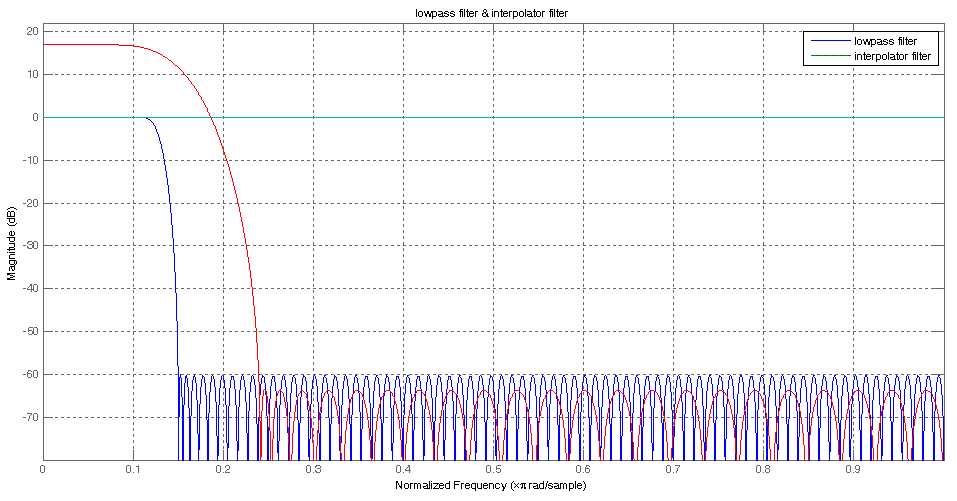标签:
项目里面有用到插值滤波器的场合,用matlab做了前期的滤波器性能仿真,产生的滤波器系数保存下来输入到FPGA IP中使用即可。
下面是仿真的代码
1 % clear all 2 close all 3 4 Nx = 4096; 5 Tx = 16; 6 nx = 0:Nx-1; 7 x = sin(2*pi*2*nx/Tx); 8 L = 7; 9 % Ny = L * Nx; 10 % ny = 0:Ny-1; 11 % yi = zeros(1,Ny); 12 % yi(1:L:Ny) = x; 13 % figure; 14 % stem(yi); 15 16 Fst1 = 0.05; 17 Fp1 = 0.09; 18 Fp2 = 0.11; 19 Fst2 = 0.15; 20 Ast1 = 60; 21 Ap = 0.01; 22 Ast2 = 60; 23 % bandpass filter works well, try lowpass to check whether DC signal affects pm 24 % hband = fdesign.bandpass(‘Fst1,Fp1,Fp2,Fst2,Ast1,Ap,Ast2‘,Fst1,Fp1,Fp2,Fst2,Ast1,Ap,Ast2); 25 hband = fdesign.lowpass(‘Fp,Fst,Ap,Ast‘,Fp2,Fst2,Ap,Ast2); 26 Hband = design(hband); 27 info(Hband); %show filter info 28 29 Fp = 0.08 %pass band corner freq 30 Fst = 0.24 %stop band corner freq 31 Ap = 0.01; %pass band attenuation(dB) 32 Ast = 80.0; %stop band attenuation(dB) 33 h1 = fdesign.interpolator(L,‘lowpass‘,Fp,Fst,Ap,Ast); 34 Href = design(h1); 35 info(Href); %show filter info 36 fvtool(Hband,1,Href,1); %show freq response 37 title(‘lowpass filter & interpolator filter‘); 38 legend(‘lowpass filter‘,‘interpolator filter‘); 39 40 % import sample_dara 41 a=dlmread(‘1.prn‘);%以字符形式打开文件 42 v1=a(:,38); %16进制转化为10进制数,存储进v1矩阵 43 figure; 44 subplot(3,1,1); 45 plot(v1); 46 v2 = filter(Hband,v1); 47 subplot(3,1,2); 48 plot(v2); 49 y = filter(Href,v2); 50 subplot(3,1,3); 51 plot(y); 52 % b=dlmread(‘2.prn‘);%以字符形式打开文件 53 % y=b(:,37); %16进制转化为10进制数,存储进v1矩阵 54 55 56 fft_analysis_func(v2,455/14/16, 16); 57 legend(‘lowpass filter‘); 58 fft_analysis_func(y,455*L/14/16, 16); 59 legend(‘interpolator filter‘); 60 61 %axis([0 25 -120 5]) %zoom-in 0 to 25MHz 62 %generating the coe file 63 ref_filter = Hband.Numerator; 64 gen_coe_rad10(Hband.Numerator,‘lowpass_filter_rad10.coe‘); 65 ref_filter = Href.Numerator; 66 gen_coe_rad10(Href.Numerator,‘inter_filter_rad10.coe‘);
代码中用到了两个函数
function fft_analysis_func(x, fs, adc_width) %The following program code plots the FFT spectrum of a desired test tone. Test tone based on coherent sampling criteria, and %computes SNR, SINAD, THD and SFDR. %This program is believed to be accurate and reliable. This program may get altered without prior notification.; %fid=fopen(‘F:\pelican_ADC_test\vjtag_prj\data_analysis\single_tone.txt‘,‘r‘); %numpt=input(‘Number of Points in FFT? ‘); %fclk=input(‘Sampling Frequency (MHz)? ‘); %numbit=input(‘ADC Resolution (bits)? ‘); % numpt=length(x); numpt = 4096; fclk=fs; numbit=adc_width; v1 = x(1:numpt); code=v1‘; %Warning: ADC output may be clipping - reduce input amplitude if (max(code)==2^numbit-1) | (min(code)==0) disp(‘WARNING: ADC OUTPUT MAYBE CLIPPING - CHECK INPUT AMPLITUDE!‘); end Dout=code; Voltage=Dout./((2^numbit-1)/2)*(0.5); Doutw=(Dout‘).*blackmanharris(numpt); %add Minimum 4-term Blackman-Harris window Dout_spect=fft(Doutw); Dout_dB=20*log10(abs(Dout_spect)); figure; maxdB=max(Dout_dB(1:numpt/2)); %numpt points FFT result in numpt/2 points spectrum %计算距离满量程的幅度差 max_voltage=max(Voltage); delta_amplitude=20*log10(max_voltage/0.5); %full scale voltage amplitude is 0.5v plot([0:numpt/2-1].*fclk/numpt,Dout_dB(1:numpt/2)-maxdB+delta_amplitude); % plot([0:numpt-1].*fclk/numpt,Dout_dB(1:numpt)-maxdB+delta_amplitude); grid on; title(‘SINGLE TONE FFT PLOT‘); xlabel(‘ANALOG INPUT FREQUENCY (MHz)‘); ylabel(‘AMPLITUDE (dBfs)‘); hold off;
function gen_coe_rad10(filt_num, fileName) %max number of coefficients num_coeffs = numel(filt_num) fileId = fopen(fileName,‘w‘); %header if COE file fprintf(fileId,‘radix = 10;\n‘); % first coefficient fprintf(fileId,‘coefdata = \n‘); for i = 1 : num_coeffs-1 fprintf(fileId,‘%8.9f,\n‘,filt_num(i)); end % last coefficient fprintf(fileId,‘%8.9f;‘,filt_num(num_coeffs)); fclose(fileId); end
仿真出的结果如下:

产生了用于滤波器的系数:
1 radix = 10; 2 coefdata = 3 -0.001219138, 4 -0.002838337, 5 -0.005111633, 6 -0.007197151, 7 -0.007796326, 8 -0.005351278, 9 0.001364815, 10 0.012476464, 11 0.026308774, 12 0.039101106, 13 0.045443072, 14 0.039549550, 15 0.017241585, 16 -0.021849408, 17 -0.072532419, 18 -0.123501332, 19 -0.158497326, 20 -0.159275461, 21 -0.109905781, 22 -0.001430991, 23 0.164384860, 24 0.373413481, 25 0.600371089, 26 0.812911647, 27 0.977825248, 28 1.067924092, 29 1.067924092, 30 0.977825248, 31 0.812911647, 32 0.600371089, 33 0.373413481, 34 0.164384860, 35 -0.001430991, 36 -0.109905781, 37 -0.159275461, 38 -0.158497326, 39 -0.123501332, 40 -0.072532419, 41 -0.021849408, 42 0.017241585, 43 0.039549550, 44 0.045443072, 45 0.039101106, 46 0.026308774, 47 0.012476464, 48 0.001364815, 49 -0.005351278, 50 -0.007796326, 51 -0.007197151, 52 -0.005111633, 53 -0.002838337, 54 -0.001219138;
标签:
原文地址:http://www.cnblogs.com/chenbei-blog/p/4682378.html